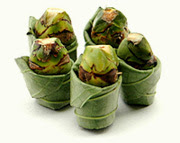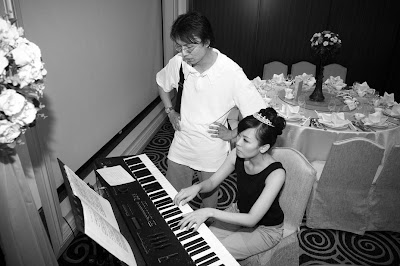Video clip courtesy of Moonwall
We may not have someone in Taiwan like Paul Potts, a mobile phone shop manager who took away the breath of the scathing judge Simon Cowell at the show Britain's Got Talent by singing Nessun Dorma ( 'let no one sleep') the famous tenor aria from the final act of Giacomo Puccini's opera Turandot, but we have Mr Xu Wenlong (許文龍), an enthusiastic and properly-trained amateur singer, who sang the same aria at a community 'ghost month' social function.The seventh month in the Chinese calendar is the so-called 'ghost month' (鬼月 guiyue), during which the gate of the netherworld is unbolted and ghosts and spirits are allowed to visit the living and have a month of bacchanals of food and drink. It is customary to placate those 'fella brethren' (好兄弟 hao xiongdi, a euphemism for ghosts who have no living family and thus wander around aimlessly) by offering them sacrifices lest they get into mischief or cause harassment.
A major ritual service is usually held on the 15th day of the ghost month and it is not uncommon to see residents of a community, together with owners of business premises within close proximity, to organise a special joined service and a social function thereafter. While in the past people would deliver performances of glove puppetry, Taiwanese opera or other kinds of entertainment as part of the offerings, nowadays people just make the social function an occasion on which neighbours, employees and proprietors drink, eat and watch whatever performance that amuses them.
It wouldn't be surprising for any Taiwanese to see scantily-clad young ladies singing or pole-dancing on this occasion. If you fancy, sometimes you can even join them, singing a song either to the accompaniment of a combo or a karaoke track. Nevertheless, it is utterly astonishing to have someone belting Nessun Dorma. Did Mr Xu mean it – let no on sleep in Ghost Month? Anyhow, I'm sure Puccini would be glad to stretch himself in his grave and learn that Taiwanese have found a new stage for this aria.



 jingzai (菁仔, 'the nut'): the most popular one, a whole raw betel nut cut half way through down the centre filled in with the inflorescence of betel pepper and red paste (made of lime and herbs and spices).
jingzai (菁仔, 'the nut'): the most popular one, a whole raw betel nut cut half way through down the centre filled in with the inflorescence of betel pepper and red paste (made of lime and herbs and spices). baoye (包葉, 'leaf-wrapped'): a whole nut wrapped in a betel pepper leaf pasted with lime.
baoye (包葉, 'leaf-wrapped'): a whole nut wrapped in a betel pepper leaf pasted with lime.







 Toads may not be as attractive as frogs to most people owing to their dry warty skin that can exude poison. However, to those Chinese feng shui practitioners, toads (蟾蜍, chanchu) are auspicious animals which bring wealth and good fortune.
Toads may not be as attractive as frogs to most people owing to their dry warty skin that can exude poison. However, to those Chinese feng shui practitioners, toads (蟾蜍, chanchu) are auspicious animals which bring wealth and good fortune.




